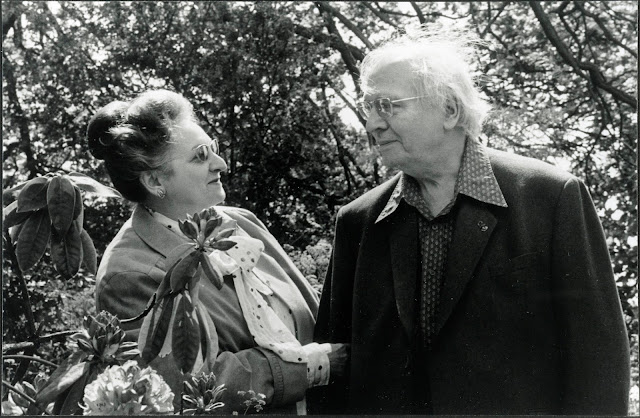 |
| Yvonne Loriod and Olivier Messiaen (Loriod, Messiaen's second wife, was the piano soloist in the premiere of Turangalila) |
Ahead of the performance of Messiaen's Turangalila Symphonie by the Guildhall Symphony Orchestra, conductor Nicholas Collon, with Cynthia Millar (ondes martenot) at the Barbican Hall on 23 November 2022, the piano soloist in the performance, William Bracken, shares his thoughts on the work.
When offered the proposal of being the soloist for the Guildhall Symphony Orchestra’s upcoming performance of Messiaen’s Turangalila Symphonie, I must confess that at that point, having heard it only a couple of times, I had little knowledge of the piece. Upon reacquainting myself with it I was excited by its strangeness, beauty, communicative power, and epic scale. I formally agreed and began the year long process of learning the piece which initially felt like starting to climb a colossal mountain, the summit of which was too far in the distance to discern. I can say with confidence that it is a piece unlike any I have ever played, and it provided a learning process unlike anything I have experienced.
There are multiple reasons for this – firstly its enormous scale; it is the longest single work I have tackled by a considerable amount, at one and a half hours long, with almost continuous playing and a large quantity of the material making extreme demands of power, stamina and virtuosity from the pianist. There is also the alien nature of Messiaen’s musical language which of course became increasingly familiar as I studied the piece and listened to others of his works. I explored different ways of processing the music, particularly Messiaen’s complex rhythmic ‘games’ – I used an Indian classical ‘Konnakol’ style process of embodying rhythm in vocal and percussive exercises, after which I was amazed to learn that Messiaen actually studied ancient Indian rhythmic practices in enormous detail and used them in his music.
The actual content of the piece was, and still is to a certain extent, baffling. Learning the piece posed many questions – what was this music trying to express, if anything? How was it going about this? Do all these complex and seemingly random rhythmic patterns mean anything; is there any structure to them? I naively anticipated that the answer to these questions would become clear after a certain amount of time with the work. This is usually the case with a lot of the earlier western classical music that I deal with in my musical life very regularly, where notions of thematic and harmonic narrative and rhetoric govern expression and make themselves known quite naturally, but in Turangalila this didn’t become any more obvious with time.
I decided to explore Messiaen’s own writings and interviews, and it very quickly became clear as to why I was so puzzled. Messiaen’s musical conception meant he was striving to express things which he claims are inexpressible in art, though music out of all the arts comes closest. In the case of Turangalila, he expresses the feelings of divine and eternal love. This is the ultimate paradox – the composer uses very clear techniques and devices in a highly systematic and functional way, which are means to allude to the most profound and universal of human experiences. For example, there is frequent use of non-retrogradeable rhythms (symmetrical rhythms), and the macro equivalent of non-retrogradeable structure, which is symbolic of the eternal, in the sense that eternal concepts escape our notion of time; they pervade beginnings and ends. Yet it is almost impossible, even for a highly-trained set of ears, to discern these patterns from a single hearing of the piece. There are many other techniques of thematic manipulation and harmonic invention that similarly escape the radar of the listener who is not well-acquainted with Messiaen’s language. However, the fascinating quality of this music is that it is simultaneously representative and expressive. There is always an undeniably intense and direct emotional tone, which transcends the formality of its compositional workings, and is laid bare for all to hear in an incredibly moving and humbling innocence.
I have just started the rehearsal process and can feel that there is a palpable sense of excitement and anticipation for this extraordinary event among everyone involved. I would urge everyone to come to the Barbican on 23 November and experience one of the greatest wonders of the 20th century for yourself.
William Bracken is currently studying performance at Guildhall School of Music & Drama. As a pianist, he has extensive recital and concerto experience and was a finalist for the Guildhall Gold Medal in 2022. William is supported in his postgraduate studies by Guildhall School and the Munster Trust.
On 23 November, William will perform as the piano soloist with the Guildhall Symphony Orchestra in their performance of Messiaen’s Turangalia Symphonie under the baton of Nicholas Collon, with Cythnia Millar (Ondes Martenot) at the Barbican Hall. Further details of from the Guildhall School website.
A pre-concert performance of Messiaen's Harawi will be performed in the Milton Court Concert Hall at 6pm. Admission for this performance is free.











No comments:
Post a Comment